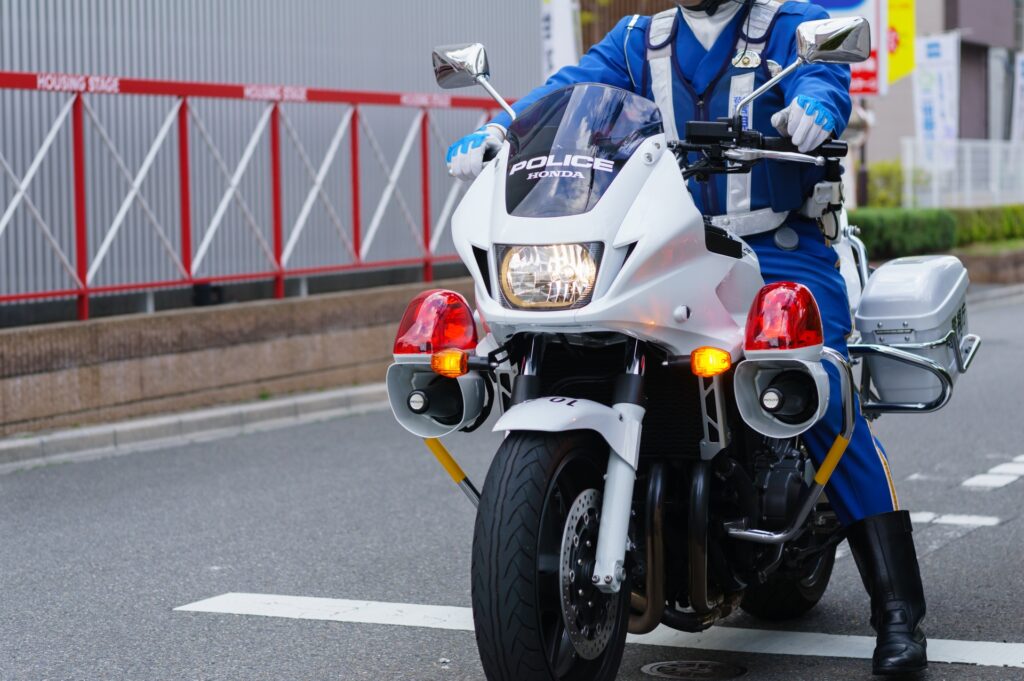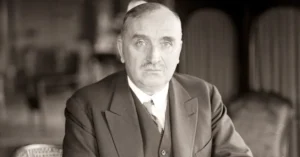(法は響き合い──罰と疑念を超えて)
Being pulled over by a motorcycle officer near the Imperial Palace was more than just a moment of receiving a traffic ticket. When a foreign diplomat witnessed the scene—an officer and a driver smiling together and even posing for a photo—it revealed something deeper: the Japanese way of maintaining public safety through trust rather than fear.

A Japanese motorcycle police officer stopped on a city street, sitting on a white bike marked “POLICE,” ready to enforce traffic safety.
Introduction
In much of the Western world, the principle of presumption of innocence—“in dubio pro reo,” or “when in doubt, favor the accused”—is considered the foundation of justice. It arose in reaction to monarchs who abused power and treated people as property. This principle has played a crucial role in protecting individuals from arbitrary punishment.
Yet Japan’s history offers a different, complementary perspective. Here, law was never meant to be a tool of suspicion or domination. Instead, it functioned as a bond of trust—a system designed to prevent harm before it happened, and to hold those in authority fully accountable for the safety of the people.
Problem / Question
The Western principle says: better to let the guilty go free than to punish an innocent. But what happens when prevention is neglected, and tragedies—murders, fires, disasters—are addressed only after they occur? Is justice truly served when society reacts too late?
Facts and Observations
The very language reveals this philosophy. When the word “police” emerged in Europe, Japan had its own terms: yoriki (“those who lend strength”), dōshin (“those of one mind with the people”), and bugyō (“those who carry out justice”). These words reflected cooperation and trust, not suspicion or control.
In recent times, a tragic case occurred in a Japanese city where middle school students murdered a classmate. The perpetrators were arrested. But under the modern, Western-influenced legal system, that was the end of it. Neither the mayor nor the police chief bore personal responsibility. Many Japanese felt a strong sense of unease, because two centuries ago, the town magistrate would have been forced to commit seppuku for such a failure.
The bugyō, or magistrate, was entrusted with extraordinary authority precisely to prevent such crimes. If tragedy struck, it meant he had failed in his duty. In Edo society, authority and responsibility were inseparable. A magistrate who took responsibility by ending his own life would preserve his family’s honor and allow his heir to succeed him. But if he delayed, an envoy from Edo would arrive with the shogun’s order: “You have failed. Take your life.” In that case, the family line would be abolished, and the household cast into ruin. Under such a system, officials were compelled to devote themselves wholeheartedly to prevention, working together with townspeople to maintain order.
This background explains why, even in modern times, police officers were affectionately called chūzai-san, local guardians respected as community leaders. People did not see them as enemies, but as partners in public safety.
I myself once experienced this spirit firsthand. While driving near the Imperial Palace in Tokyo, I was pulled over by a motorcycle officer and directed to stop my car by the roadside. He issued me a traffic ticket right there. At that moment, a European embassy staffer happened to jog past. Seeing me, the “offender,” standing beside my car and cheerfully chatting with the officer who had just fined me, he looked astonished.
“Why are you smiling with the police when you have been stopped?” he asked.
I replied, “Because we trust the police. They protect our safety. Being friendly with them is only natural.”
The young diplomat was so impressed that he asked if he could take a photo with us to show his ambassador. And so, the officer, the embassy staffer, and I—ticket in hand—all stood together by my car near the Imperial Palace, smiling for the camera.
Scenes like this are not unusual in Japan. They happen because, here, the relationship between authority and citizens is shaped not by fear, but by trust.
Thoughts and Interpretation
This contrast is striking:
• In the West, law arose from fear of rulers, aiming to restrain their power.
• In Japan, law grew from trust and accountability, binding rulers to the people they served.
Neither model is sufficient on its own. Excessive trust can invite abuse; excessive suspicion can corrode harmony. But when combined, they reveal a fuller vision: justice that protects individual rights while also preventing harm through shared responsibility and resonance.
Thus, law is not merely a shield against tyranny. It can also be a bridge of trust, a structure that allows society to resonate together, ensuring that power, accountability, and compassion move as one.
Conclusion
Japan’s history reminds us that prevention, responsibility, and trust are as vital as legal protections. The purpose of law is not only to punish after harm is done, but to sustain harmony so that harm is avoided altogether.
In today’s fractured world, we may need to rediscover law not simply as a set of rules, but as a practice of resonance—where authority and citizens share responsibility, resonate in trust, and build a society where safety and dignity are secured for all.
[Author’s Note]
When I recall that day by the Imperial Palace—standing beside my car, a traffic ticket in hand, smiling together with a police officer and a foreign diplomat—it feels like more than just an amusing anecdote. It is, in fact, a glimpse of what law can truly mean when it is rooted in trust rather than fear.
Japan’s tradition reminds us that authority and responsibility must move together, like two sides of a single heartbeat. Law, at its best, is not a weapon against people but a vessel of resonance, allowing rulers and citizens to share in the duty of harmony.
We live in an age where division and suspicion easily take root. Yet if we return to this spirit of resonance—of 共震共鳴響き合い—we may rediscover that justice is not only about rules or punishments, but about the trust that enables us to live, side by side, without fear.


